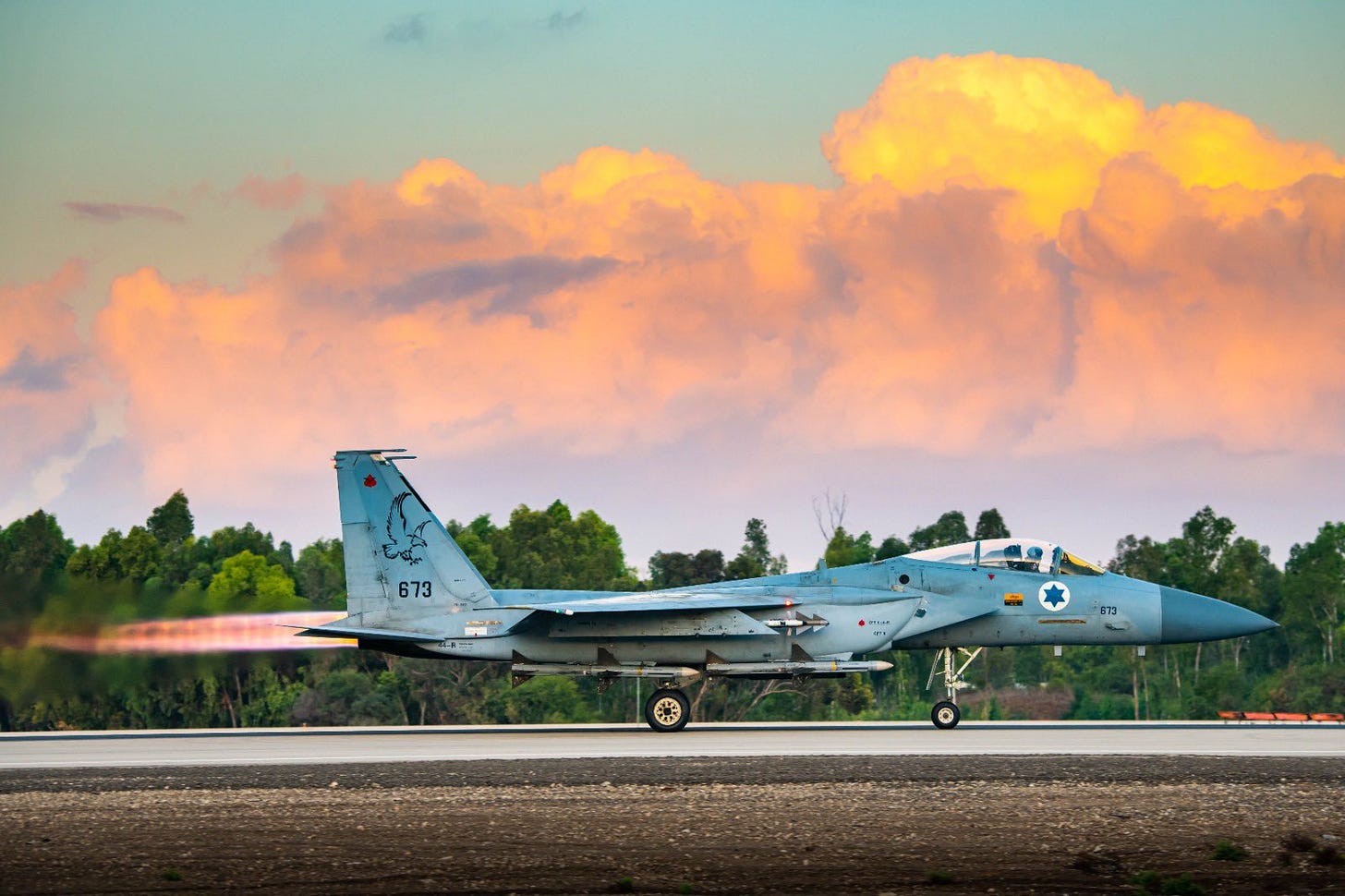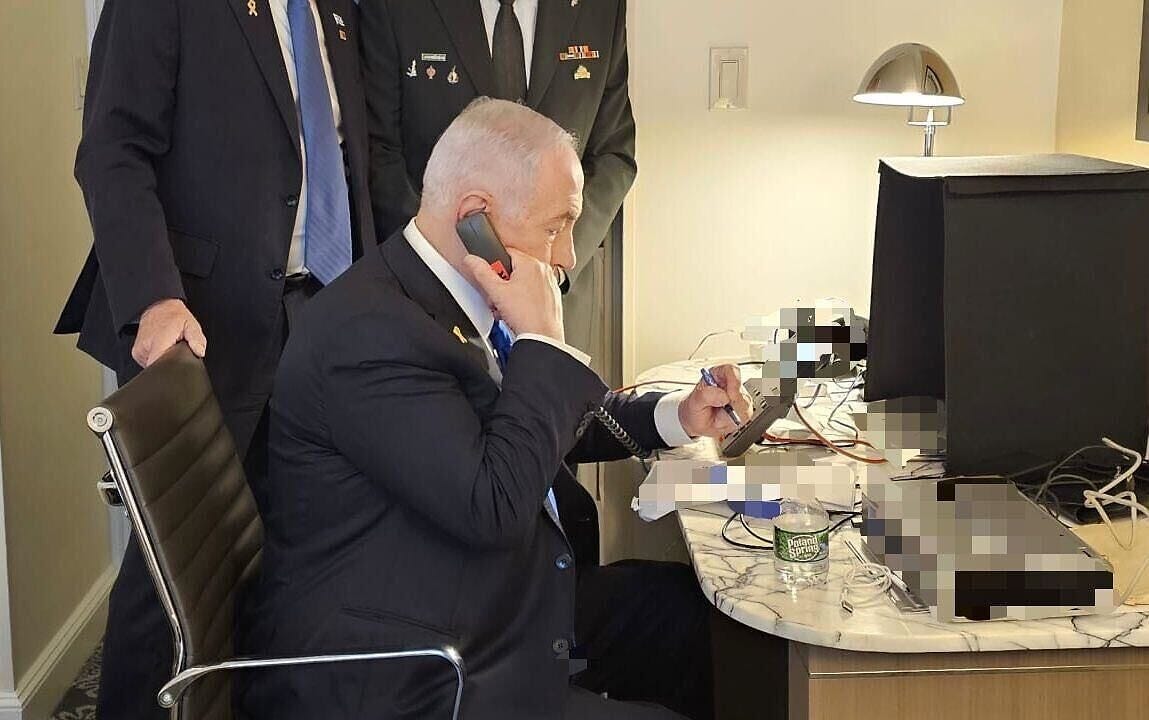Israel's image of victory takes shape.
The Jewish state has turned the unbelievable debacle of October 7th into an impending victory in what will eventually become known as the First Israeli-Iranian War.

Please consider supporting our mission to help everyone better understand and become smarter about the Jewish world. A gift of any amount helps keep our platform free of advertising and accessible to all.
You can also listen to the podcast version of this essay on Apple Podcasts, YouTube Music, YouTube, and Spotify.
The Israeli Air Force carried out massive targeted airstrikes in the Lebanese capital of Beirut on Friday evening, with the IDF announcing it had struck Hezbollah’s main headquarters.
The attack shook the Lebanese capital and sent thick clouds of smoke over the city. There were reports of many casualties in the multiple strikes.
A source close to Hezbollah said the Israeli strikes included bombs totaling dozens of tons of powerful bunker-penetrating explosives, flattening six buildings.1 The bombing was not aimed at one point of attack but spread over an area of several hundred square meters above and below the ground. It was the heaviest attack in Beirut throughout almost a year of conflict between Hezbollah and Israel, after the terror group joined the Israel-Hamas war just 24 hours after Hamas started it.
Local reports in Hebrew-language media suggested the Israeli assessment is that Hezbollah chief Hassan Nasrallah was killed in the strike. Amos Yadlin, a former head of IDF intelligence, told Israel’s Channel 12 news that such a strike in the Lebanese capital would not have been approved without “absolute certainty” that Nasrallah was in the targeted area. He also said that his sources are adamant Nasrallah “is no longer with us.”
Even Ali Larijani, an adviser to Iranian Supreme Leader Ali Khamenei, just an hour ago told Iranian state television that “any leader of the resistance will be replaced” — an implication that Nasrallah has likely been eliminated.
If Israel was ever looking for an “image of victory,” this is it.
The strike was carried out by the Israeli Air Force’s 119th “Bat” Squadron, using an F-16i aircraft known as “Sufa” (Hebrew for storm). It is likely that if Nasrallah was not at the murder scene, Hezbollah would have already presented proof of this or at least issued a statement on the matter. But the terror group does not know, so it is silent.
The question at the moment is what the attack will do to Hezbollah — and what Hezbollah will do to Israel. The terrorist organization is heavily entrenched in Lebanese politics with an army of 30,000-to-50,000 operatives at all levels, and an arsenal of rockets, cruise missiles, and UAVs that most countries in the world, including European powers, do not have.
In the last nine days, Israel disabled a large part of the terrorist organization’s high and medium chain of command through targeted attacks. But the assassination of Nasrallah, if successful, easily outweighs them all.
Israeli Air Force planes dropped tons of munitions in Beirut while Prime Minister Benjamin Netanyahu was in New York. Netanyahu left in the middle of a briefing with Israeli reporters after his speech at the United Nations as news emerged of the strike. Netanyahu’s military secretary whispered something in his ear, before he cut the briefing short and left with his advisors. His office released a photograph that it said showed him approving the strike from his New York hotel room, evidently before he addressed the UN.
Addressing the UN General Assembly shortly before the strike, Netanyahu said: “As long as Hezbollah chooses the path of war, Israel has no choice, and Israel has every right to remove this threat and return our citizens to their homes safely. Israel has been tolerating this intolerable situation for nearly a year. Well, I’ve come here today to say enough is enough.”

In the past week and a half, since increasing its focus on Lebanon, the IDF said that it has made significant achievements, including killing top Hezbollah commanders, eliminating the leadership of the terror group’s elite Radwan Force, and striking thousands of sites where Hezbollah stores arms.
There had been plans for a 21-day ceasefire intended to pave the way for a permanent cessation of hostilities between Israel and Hezbollah and help advance an end to the war in Gaza, which was jointly announced by U.S. President Joe Biden and French President Emmanuel Macron on Thursday while Prime Minister Benjamin Netanyahu was en route to New York to address the UN General Assembly today.
Instead, Israel rebuffed the ceasefire attempt and reminded the world what much of it seems to have forgotten: There is no negotiating with Jihadist terrorists.
In a 2022 interview on Al-Manar TV, Zainab Nasrallah (the daughter of Hezbollah leader Hassan Nasrallah) described her family’s reaction to the death of her brother, Hadi, who was killed by Israeli forces in 1997, saying: “When my brother Hadi was ‘martyred,’ my parents did not shed a single tear.”
Zainab noted that her mother viewed Hadi’s death as a “shortcut” to the afterlife, and the family chose to honor his sacrifice rather than mourn traditionally, adding: “We are embarrassed that we have made such a small sacrifice compared to other families of martyrs.”
Well, the Nasrallah faithful ought not to be embarrassed anymore. Israel appears to have taken out Zainab and her father on Friday evening, hopefully providing them a much-desired “shortcut” to the afterlife.2
Hassan Nasrallah, at age 64, has been Hezbollah’s leader for four decades — and one of Israel’s most obscene adversaries in recent decades.
He is closely aligned with Iran, and although Nasrallah did not found Hezbollah in the early 1980s, he has shaped the terrorist organization in his image. If Israel’s assassination of Nasrallah was successful, the move automatically signals a “change in the rules of engagement” in Israel’s fight against the Islamic Republic of Iran’s axis of evil.
Historically, Iran did not cultivate Hezbollah in Lebanon to launch a war against Israel, but to help deter the Jewish state from attacking Iranian nuclear facilities in its push to become the second nuclear state in the Middle East behind Israel. Indeed, Hezbollah’s rocket arsenal exists precisely to defend Iran and its most valuable nuclear assets by threatening to let loose against Israel should it ever target them.
By diminishing Hezbollah’s threat to Israel during the last nine or 10 days, the Jewish state has built more leverage for if and when it wants to take military action against the Iran. Two of the Iranian regime’s top proxies — Hezbollah and Hamas — are now battered beyond belief. Just today, Israel’s Kan public broadcaster reported, citing unnamed sources, that the IDF said Hamas’ military wing has been defeated and the group is now functioning merely as a guerilla organization. There have also been reports in recent days that Hamas leader Yahya Sinwar might have died.
Of course, the Iranian regime will posture left and right to show its people and the Middle East how big of a you-know-what it supposedly has. In theory, harming Nasrallah is equivalent to harming a religious Shia Muslim leader — flesh and blood of the sect through which Iran intends to establish the Islamic revolution across the entire Middle East and then the world. Harm to Nasrallah obliges Tehran, if only from a religious-sectarian aspect, to avenge his blood.
In lockstep, Iran’s embassy in Lebanon wrote on X tonight that the Israeli strike on Beirut’s southern suburbs targeting Hezbollah’s headquarters is a “reprehensible crime” that “represents a dangerous escalation that changes the rules of the game” and will “bring its perpetrator an appropriate punishment.”
Not exactly.
Remember the unprecedented pager and walkie-talkie attacks that Israel allegedly launched last week against Hezbollah in Lebanon and Syria?
A senior Iranian official even said that Tehran was involved in purchasing the pagers held by Hezbollah terrorists — hinting that such a device could have been responsible for the helicopter crash that killed Iranian president Ebrahim Raisi in May. Mind you, Iran’s “official investigation” into the crash haphazardly determined that it was caused by “bad weather” after the helicopter carrying Raisi (as well as Iran’s then-foreign minister and others) came down on a fog-shrouded mountainside in northern Iran.
There was also the raid on Syrian soil two weeks ago in which a Iranian missile production facility built inside a mountain was destroyed by Shaldag, one of the premier Israeli Air Force commando units.
And, back in the wee hours of July 31st, 2024, a bomb exploded in Hamas leader Ismail Haniyeh’s room in the official and well-protected residence of Iran’s Islamic Revolutionary Guard Corps. The compound, called Neshat, is in an affluent north Tehran neighborhood and used for retreats, secret meetings, and “housing prominent guests” such as Haniyeh. Middle Eastern officials said the bomb was planted there roughly two months prior, detonated remotely by Mossad operatives who were on Iranian soil after receiving intelligence that Haniyeh was indeed in the room.
Other than with provocative-yet-empty words, Iran did not respond to either Israeli assassination — Haniyeh’s and Raisi’s — despite both taking place within Iranian borders.
And it will not respond to Nasrallah’s murder, either. After all, it cannot. Unless it wants to cordially invite direct Israeli attacks that expedite the Iranian regime’s inevitable demise. As Israel has shown with its completely superior intelligence and military prowess since October 7th, such capabilities are not in question.
Regardless, the Iranian regime’s days are numbered. It might take months or even years, but Israel has turned the unbelievable debacle of October 7th into an impending victory in what will eventually become known as the First Israeli-Iranian War — and hopefully, for the supreme benefit of the Middle East and greater world, the last.
Back in Gaza, Hamas leader Yahya Sinwar (if he is still alive) sees what has befallen Nasrallah. He understands that his fate will surely be similar and knows that his death will only diminish Hamas’ goal of continuing its tenuous survival in the Strip.
On one hand, Nasrallah’s elimination sharpens the possibility of a regional war from which Sinwar may profit, in which case he will not rush to agree to a hostages-for-ceasefire deal.
But my feeling is: The welcomed assassination of Nasrallah will actually increase the chances of renewing the efforts to successfully secure a hostages-for-ceasefire deal, mainly because it rattles the region and prompts all of Israel’s adversaries in their multi-front war to reconsider their positions and reassess their interests — or suffer the same conclusion as Nasrallah.
“IDF conducts massive strike on Hezbollah HQ in Beirut; Nasrallah’s fate unclear.” The Times of Israel.
“Zainab Nasrallah, daughter of Hezbollah leader, reportedly killed in Beirut strike.” The Jerusalem Post.


And Israel has done all this in the face of open and strong American opposition.
Thank you for a timely and thorough update. I appreciate your efforts on behalf of Israel.